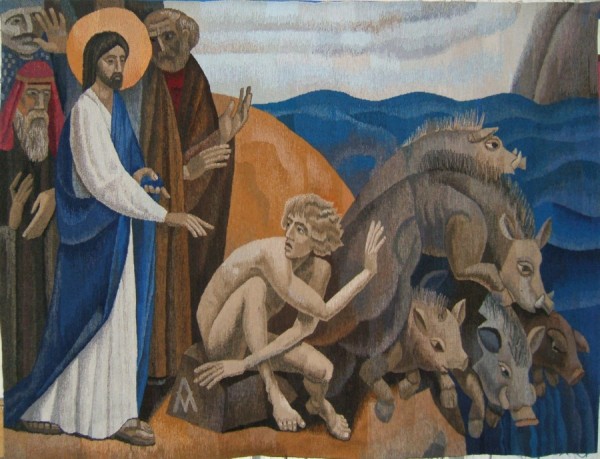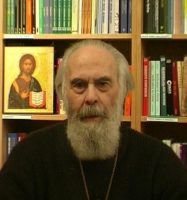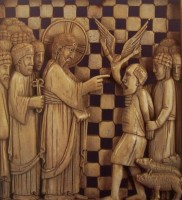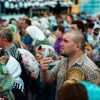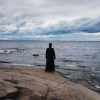Our Lord Jesus Christ has numerous encounters with those who have been possessed (indwelt) by the demons, whom the demons torment and control, forcing them to do their bidding and destroying themselves and others, ultimately leading to their death, both spiritual and physical. Today’s Gospel is one such account.
Now, there are two errors that we can commit in our thinking as regards the demonic: One is that we teach others that demons and those who worship Satan are just scary but innocent fun, that there’s really no such thing as witches, demons, and the devil himself; the other is to attribute too much power to Satan and his minions, the demons, and those who serve them—in other words, to be afraid of them and attribute more power to them than to God.
Holy Tradition clearly teaches us that Satan and his demons are a spiritual force to be reckoned with, that we have to contend with, fight and struggle against. St. Paul reminds us of this when he says, “we do not wrestle against flesh and blood, but against principalities, against powers, against rulers of the darkness of this age, against spiritual hosts of wickedness in the heavenly places” (Eph. 6:12).
The two men, the Gergesene demoniacs, are possessed by a whole legion of demons who torment them. We read, that the men are violent, “exceedingly fierce,” so that no one could “pass that way.” Appropriately, these men live among the tombs because they are truly among the living dead. They are enslaved by the demons and their God-given faculties, the beautiful nous (eye of the soul) that God placed in them has been darkened, obscured by the spiritual confusion and paralysis that surrounds them by this host of demons.
We don’t know how they came to be possessed. There are many sins and practices that can give the devil a foothold. All of us can come under demonic influence. Some people actually come to be possessed by the demons if they do not have the Holy Spirit indwelling them instead.
Likewise, certain sinful practices can make a foothold for demonic influence or possession as well: pornography, drugs, even video games when played to excess can altar one’s reality and become an entry point for demomic activity.
With regard to demonic possession, we have no reason to believe that it does not continue in our own day; in fact, we can be sure that it does. The same demons active in Christ’s day, are still active today and will be until the Second Coming of Christ.
And while medical science may treat the symptoms of demonic possession—some of which may be mistakenly labeled under the generic title of “mental illness,” it cannot cure that possession or influence with drugs. There is a mystery here: What we do know is that only the healing in Christ through the new life in Him, the exorcism of the demons, and the indwelling of the Holy Spirit, and our continued “Yes” to God’s healing work in our lives, can drive them away.
Exorcism is the first part of the Sacrament of Holy Baptism and a necessary precursor to putting on Christ. We expel the demons and their influence from the neophyte (the newly illumined) so that Christ may come and make His abode with him through the indwelling of the Holy Spirit at Chrismation.
Christ came that we may be free of the demons, free of their control and influence, that we may not be enslaved by them. This freedom is given us by virtue of our choosing life with Him who is the Life over the living death that Satan and his minions give those whom they enslave. Christ came to equip us by the Holy Spirit to do battle against those spiritual forces of wickedness so that we may overcome our passions and their temptations that wage war against our life with God and so that those footholds of the demons may be healed by Christ God, the Great Physician of our souls and bodies.
As Orthodox, we’re not afraid of the demons: “He who is in you is greater than he who is in the world” (I Jn. 4:4), St. John assures us. At the same time, as Orthodox we don’t downplay the reality of the evil we are fighting against. Satan is described by Christ as the “murderer of man.” He and his demons are bent on our destruction. We certainly don’t pretend that witches and demons and ghosts are innocent fun or make them look ‘cute’, nor do we participate in activities that may make others think that this is what we believe as Orthodox Christians.
As for the Gergesene demoniacs, Christ cast out those demons and sent them into a herd of swine and they drowned at sea. The men went their way, freed of their demonic enslavement and proclaimed through the whole city what great things Jesus had done for them. The destruction of the herd of swine shows us the incomparable value of human life, whose salvation, as the Orthodox Study Bible puts it, “is worth every sacrifice.”
While those indwelt by the Holy Spirit may not be indwelt by the demons, their influence can still wreck havoc on our lives IF we let them. We must exercise great discipline and vigilance to fight against them through our “No!” to sin and our “Yes!” to God, which is manifested in the cross of our daily repentance and our humbling ourselves through sacramental confession. By keeping short accounts with God in His Church, we allow Christ God to step in to heal those places most susceptible to the influence of the prince of this world and enable us to gain the victory by God’s grace.
This is the good news inherent in today’s Gospel. There is nothing in this world or of this world that can destroy us if we avail ourselves of our God-given life in Him, struggling for healing from our passions and learning to recognize the dangers of those habits and practices so often accepted or even encouraged these days in our culture, but which lead us away from Him who is life and who calls us to holiness, being transformed into His likeness more and more. This is the journey of salvation from this world and the prince of this world that Christ God leads us on. Remember: “He who is in you is greater than he who is in the world.”












